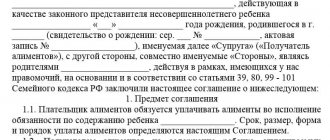In this case, he will have to prove why he needs additional support and why in this particular amount.
In particular, the following may be accepted as necessary expenses borne by the parent:
- Utility costs;
- Medical expenses – treatment, procedures, prevention;
- Expenses for medicines;
- Food expenses.
In all cases, the principle of reasonableness and necessity applies. Thus, the need for medical procedures will need to be confirmed by an appropriate doctor’s prescription, and collecting alimony to pay for expensive alcohol and delicacies is unlikely to be possible.
IMPORTANT: If a parent abuses alcohol or suffers from gambling addiction, then it will be very difficult for him to collect child support from the child.
Not for pensioners
A citizen who has not retired has the right to receive alimony from his adult, able-bodied child if he is a disabled person of the first or second group, which excludes his ability to work.
In addition, he must prove that he needs alimony payments, that is, justify his expenses and correlate them with income.
Example from practice: Group 2 disabled person S. filed a lawsuit against his daughter A., indicating that due to loss of ability to work, he has no means of subsistence and is experiencing difficulties in meeting his current needs. During the trial, it turned out that S. had deposits in bank accounts totaling almost 3 million rubles, the accrued interest from which he regularly withdraws and spends on unconfirmed needs. The defendant did not provide information on how much he pays for utilities and other expenses. In addition, S. is a recipient of a disability pension. His total income, including pension and interest on bank deposits, significantly exceeds the subsistence level. In this regard, the court refused to collect alimony.
Do children pay child support to retired parents?
Taking care of such socially vulnerable segments of the population as the elderly, the legislator in Article 87 of the RF IC provides that children are obliged to financially support their elderly parents. In this case, there are conditions related to both the first and second:
- Children must be of age and capable of working.
- Parents must be elderly (pensioners), financially insecure, seriously ill or disabled.
If these conditions are met, elderly, sick and needy people have the opportunity to apply to the court for maintenance.
Old age alimony
Both fathers and mothers have the right to child support. The only difference is in the age at which, on this basis, one can count on help. In accordance with the Law on Labor Pensions No. 173-FZ of December 7, 2001, men become age pensioners from the age of 60, women from the age of 55.
Note! If a person retires not because of age, but, for example, because of length of service, then this circumstance is one of the reasons for challenging the right to alimony by his children.
Contents for disabled people
Parents who are disabled or seriously ill people can also count on maintenance, but subject to several conditions:
- disability or serious condition must be confirmed by a certificate from the Bureau of Medical and Social Expertise in the first case and a certificate from a medical institution in the second;
- income for one month should be no more than 1/2 of the subsistence level in the region, which also must be documented.
Payments to those in need
Parents can file for child support in court if they are in need. Need in law means:
- lack of ways to provide for yourself;
- inability to live on pensions and benefits received from the state.
Note! The very fact of need can be determined by the court based on specific circumstances. If a parent has the opportunity to support himself, for example, by doing light work at home, but he does not, child support may be denied.
Alimony obligations of spouses (former spouses)
Spouses
(former spouses)
are obliged to provide maintenance to each other subject to the conditions
(legal facts)
established by law.
This duty stems from the general principle that spouses must provide each other with material and moral support.
The conditions (legal facts) for the provision of maintenance are the incapacity and neediness of the spouse, i.e. inability to provide for one’s own maintenance with one’s own resources.
The spouse retains the right to receive alimony even after the dissolution of the marriage, provided that his incapacity for work occurred before the dissolution of the marriage or within one year from the date of dissolution of the marriage. In cases where the spouses have been married for a long time, the court has the right to collect alimony in favor of the spouse who has reached retirement age no later than five years after the divorce.
The wife also has the right to receive alimony during pregnancy and for three years from the birth of the child. A woman retains this right even if the marriage is dissolved, but provided that the pregnancy occurred before the divorce. In this case, the wife (ex-wife) does not need to prove the fact of her disability and need. They are assumed because during pregnancy, working capacity gradually decreases, and by the end of pregnancy, during childbirth and for a certain time after it, it is completely lost. During pregnancy and after childbirth, costs increase dramatically. A woman needs additional funds for food, special clothing, rest, treatment, etc. Both spouses must bear these costs. Payment of state benefits to a woman for pregnancy and childbirth, for the care of a young child, as well as payment of funds (alimony) for the maintenance of a child do not relieve the husband of the obligation to support his wife.
The right to alimony also has a spouse (former spouse) caring for a disabled child until the child reaches the age of eighteen or for a child disabled since childhood, group I.
Spouses (former spouses) have the right to independently determine the amount of alimony and the procedure for its provision by concluding an appropriate written agreement and having it certified by a notary. In the absence of such an agreement, the amount of alimony is established by the court when making a decision to collect alimony at the request of an interested party (disabled and needy spouse, pregnant wife, etc.). The amount of alimony is established by the court in a fixed amount,
corresponding to a certain number of minimum wages. When determining the amount of alimony, the financial and marital status of each spouse and other noteworthy interests of the parties are taken into account. Alimony collected by the court is paid monthly (Article 91 of the RF IC) and is subject to subsequent indexation.
The court has the right to refuse to award alimony at all or limit its payment to a certain period:
- in the event that the spouse’s (former spouse’s) incapacity for work occurred as a result of alcohol abuse, drug abuse, or as a result of his committing an intentional crime;
- in case of a short stay of the spouses in marriage (in practice, as a rule, less than five years);
- in case of unworthy behavior in the family of the spouse (former spouse), requiring payment of alimony (neglect of family responsibilities, constant adultery, cruelty to wife and children, etc.).
In what cases are children exempt from paying child support?
As mentioned above, in order for child support to be collected from parents, they must reach the age of 18 and be able to work, that is, not be disabled.
There are a number of situations where children who meet these conditions can legally avoid the obligation to help elderly parents. This can happen if during the trial it turns out that the mother or father was previously dishonest in their responsibilities for raising and maintaining the child. These facts include:
- Evasion of fulfilling alimony obligations to provide for a minor son or daughter.
- Payment of alimony without taking the necessary participation in raising the child, in providing additional financial assistance when it was especially necessary. For example, when a child needed expensive medications or additional medical care due to placement in a paid clinic.
- Deprivation or restriction of a parent's rights by court.
Payments as a share of income
The most common payment method is a certain percentage of the salary. According to the RF IC, the shares should be:
- for an only child - 25% of income;
- for 2 children - 33.(3)%;
- by 3 or more - 50%.
However, these shares are used only in the general case. During the proceedings, the court may, if it considers it necessary, at the request of the participants in the proceeding, reduce or increase the share. A reduction is usually allowed if a spouse's income is so low that after paying alimony in that amount, he will not be able to support himself, his new family, or his other dependents.
Conversely, the court may increase the share due to the child if the share established by law does not cover the necessary expenses. But even in this case, the absolute maximum that can be recovered from a person is 70% of earnings.
Amount of payments for the maintenance of parents
Alimony for parents of pensioners is calculated in a fixed amount, which is a certain part of the subsistence level in force in the region. It can be either less than this minimum or more than it (for example, 0.9 or 1.5 PM). If such an indicator is not recorded at the place of residence, the amount established for Russia is taken. Alimony to parents must be paid once a month; there is no minimum or maximum amount in Russian legislation.
In all cases, the judge takes into account the specific circumstances of the case, among which the main role is played by the financial and marital status of both children and parents. The court takes into account factors such as:
- the presence of a disabled father or mother with a wife or husband who, by law, must provide them with financial support and have the opportunity to do so;
- pension amount;
- the presence of other sources of livelihood, for example, property that can be rented out;
- whether the needy parent has other adult children;
- the amount of their income;
- the composition of the family of a son or daughter, the presence of dependents in it.
Other nuances of assigning the amount of child support to parents from children
- If one of the children helps the father or mother by caring for them, the amount of support may be reduced.
- If the financial situation of any of the parties changes, each of them can apply for a decrease or increase in the amount of payments.
- If your health deteriorates and there is a need to incur additional costs in connection with this, a request for additional financial assistance may be submitted.
- When the cost of living increases, child support obligations also increase. If the PM decreases, alimony for the maintenance of parents remains the same.
Note! If a father or mother makes a demand for payment of alimony in their favor to one of several existing children, the court has the right to oblige others who are adults and able-bodied to provide financial support.
Parents' child support obligations
Alimony obligation
The alimony obligation is a legal relationship arising on the basis of legal facts provided for by law:
agreements on the payment of alimony or a court decision on the collection of alimony, by virtue of which some family members have the right to demand payment of alimony from other family members, and the latter are obliged to pay them.
The obligation to maintain exists only between family members specifically specified in the law:
- between parents and children (Articles 80–88 of the RF IC);
- between spouses or former spouses (Articles 89–92 of the RF IC);
- between brothers and sisters (full and half-blooded) (Article 93 of the RF IC);
- between grandparents and grandchildren (Articles 94 and 95 of the RF IC).
Alimony obligations are also assigned to:
- actual pupils in relation to their actual educators (Article 96);
- stepsons, stepdaughters in relation to a stepfather, stepmother (Article 97 of the RF IC);
- former adoptive parents in relation to former adopted children upon cancellation of adoption (Article 143 of the RF IC).
This list is exhaustive.
Provision of maintenance (payment of alimony) is carried out in most cases if the conditions specified in the law are met. Such content is provided in a specific order.
Parents are primarily obligated to support their minor children. When parents live together and jointly take care of the needs of the family, they also take care of the material needs of their children. However, discord in the family, its breakdown, or separation of parents do not affect the obligation of each parent to provide funds for the maintenance of their child.
The responsibility of parents to support minor children arises from one fact - kinship. The law does not provide any other conditions for the emergence of this parental obligation. The absence of marriage between the parents does not matter for the emergence of the father’s obligation to support the child if paternity has been established in the manner prescribed by law (voluntarily or in court).
Parents living separately from their children do not have the right to refuse to support their children, citing their poor financial situation. Whatever it is, they are obliged to allocate a certain part of their funds for the maintenance of their children. The fact that the minor receives sufficient funds from other persons (another parent or relatives) does not serve as a basis for exemption from this obligation.
The procedure and form of providing maintenance to minor children is determined by the parents independently. A parent living separately from the child can transfer money by mail, to the child’s bank account, etc. Parents also have the right to enter into an agreement on the maintenance of minor children, which is called an “agreement on the payment of alimony.”
The possibility of concluding such agreements is a novelty in family law.
The agreement to pay alimony is concluded in writing, is subject to notarization and has the force of a writ of execution (Article 100 of the RF IC). In this agreement, parents have the right to determine the amount, methods and procedure for paying child support. Alimony may be paid in shares of the parent’s earnings (other income); in a fixed sum of money, paid periodically or at a time by providing property, as well as in other ways regarding which an agreement has been reached between the parents (Articles 103 and 104 of the RF IC).
If parents do not provide maintenance to their minor children (in any form), funds for the maintenance of children (alimony) are collected from the parents in court (by court decision).
Amount of alimony collected for children
Amount of alimony collected for children
in court, determined by law.
As a general rule, they are collected in shares of the earnings (income)
of the father or mother: one quarter is recovered for the maintenance of one child, one third for two children, and half of the earnings and (or) other income of the father or mother for the maintenance of three or more children. The amount of these payments may be reduced or increased by the court, taking into account the financial or marital status of the parties and other noteworthy circumstances (Article 81 of the RF IC).
For example, the size of the share can be reduced if minor children from a new marriage living together with the alimony payer turn out to be less well off compared to the children for whose maintenance alimony is being collected. It is possible to reduce the amount of alimony if the alimony payer is disabled. A reduction in the share is also possible if the teenager for whose maintenance alimony is being collected works and has his own income.
Collection of alimony is made from those types of earnings and (or) other income of the parents, the list of which is established by Decree of the Government of the Russian Federation of July 18, 1996 No. 841. These include all types of wages (monetary remuneration, maintenance) and additional remuneration as at the main place work, and for part-time work, which parents receive in cash (in national or foreign currency) and in kind, all types of pensions, scholarships, temporary disability benefits, unemployment benefits, etc.
The corresponding share is determined from the amount of earnings (income) that is due for payment after withholding taxes.
The amount of alimony can be determined by the court as a fixed sum of money
(Article 83 of the RF IC), corresponding to a certain number of minimum wages (for example, in the amount of two minimum wages). It is subject to indexation, which is carried out automatically in proportion to the increase in the minimum wage established by law (Article 117 of the RF IC).
The amount of alimony in a fixed monetary amount is determined at the request of one of the parents or at the initiative of the court itself in cases where the parent obligated to pay alimony has irregular, changing earnings or other income (for example, creative workers, entrepreneurs) and receives earnings (income) fully (partially) in kind or in foreign currency, has no earnings (income), and also in cases where the collection of alimony in proportion to the earnings (income) of the parent is impossible, difficult or significantly violates the interests of one of the parties.
Maybe
also
establishing the amount of alimony simultaneously in shares and in a fixed sum of money
in relation to various types of earnings (income) of the parent obligated to pay alimony.
Alimony is awarded from the moment you file a claim with the court to collect it. During the time preceding going to court, alimony can be collected, but not more than three years and only in cases where, before going to court, measures were taken to obtain it, but the debtor evaded paying it (Article 107 of the RF IC) .
In order to ensure the rights and interests of children, the court has the right to make a ruling on the temporary collection of alimony until the consideration of the case on the merits (Article 108 of the RF IC). Such a determination is usually made if there is reason to assume that the consideration of the case will be delayed for some reason and the child will find himself without the funds necessary to support him.
Persons filing a claim for alimony in court are provided with a number of procedural benefits. They have the right to go to court both at their place of residence and at the place of residence of the person from whom alimony is being collected (the defendant). For applications for alimony, the plaintiff does not pay a state fee. The payment of the fee by a court decision is assigned to the defendant. The courts help plaintiffs in collecting the necessary documents, and in cases where the location of the defendant is unknown, they launch a search for him. The claim for alimony must be considered by the court within a short period of time: within 10 days if the defendant lives in the same area as the plaintiff, and within 20 days if he lives in another place. The court decision to collect alimony is subject to immediate execution, i.e. regardless of whether it is appealed or not.
In the absence of a dispute between the parents (about the origin of the child, the amount of alimony, etc.), consideration of the application for the collection of alimony for minor children is carried out by a single judge, without initiating a civil case. In these cases, the judge issues a court order, which has the force of an executive document (Article 1252 of the Code of Civil Procedure of the RSFSR). In case of refusal to issue a court order, the applicant has the right to file a private complaint or bring a claim for the recovery of alimony through a lawsuit.
For malicious evasion of payment of alimony awarded by the court, the perpetrators are brought to criminal liability (Article 157 of the Criminal Code of the Russian Federation).
As a general rule, child support is paid until the child reaches eighteen years of age.
For adult children, alimony is collected from parents only if the children are disabled (disabled people of group I, II or III) and need help (do not receive a pension sufficient for their existence, etc.).
The amount of alimony for adult disabled children is established by the court in a fixed amount of money, paid monthly. This amount is determined depending on the financial and marital status of parents and children and is subsequently indexed in proportion to the increase in the minimum wage (Article 117 of the RF IC).
In the presence of exceptional circumstances (serious illness, injuries to adult children in need, the need to pay for outside care for them, etc.), parents may also be called upon by the court to participate in bearing additional expenses caused by these circumstances (Article 86 of the RF IC).
Payment of alimony for adult disabled children can also be made on the basis of an agreement on the payment of alimony concluded by the parties.
Notarized agreement on payment of alimony
In addition to forcing children to support their elderly parents, the RF IC provides for an agreement between the parties that is voluntary. It is preferable from the point of view that it involves various options for conditions.
So in the agreement on the payment of alimony between parents and children, you can stipulate:
- The amount of payments determined by both parties, which can be calculated as a fixed amount, as a percentage, in parts of wages, other income, the minimum wage, or the subsistence level.
- An option for transferring ownership or disposal of expensive property, for example, an apartment that is to be rented out.
- Payment terms range from once a month or quarterly to a lump sum receipt of a large amount.
In addition, resolving the issue on a voluntary basis allows:
- reduce the time required to resolve the situation;
- avoid family conflicts;
- do not resort to contacting official authorities.
Such an agreement is always drawn up in writing and must be certified by a notary. He is a guarantor of the legality of the conditions included in the contract, which should not be aimed at infringing on the rights or interests of either children or parents.
Note! Without notarization, an agreement on the payment of alimony will not have legal force, whereas if executed correctly, it is equivalent to a writ of execution in the event of the need for forced collection. You can go to court or the FSSP with him.
To contact a notary you will need the following set of documents:
- Passports of the parties involved in the agreement.
- Documents indicating the degree of relationship: birth certificates of children, establishing paternity or maternity, or a court decision on this.
- Certificate from the ITU Bureau regarding disability if the parent has not reached retirement age.
- Certificates of income for each party - from the place of work for children, from the Pension Fund for parents.
The agreement is drawn up in three copies, one for each party, one for leaving in the notary’s office. For the notary service to certify the alimony agreement, you must pay 250 rubles.
Parental support agreements
Additional payments
In addition to the payments established by the court decision, additional amounts may be collected from one of the parents. They are prescribed in the following cases:
- when a child suddenly needs new expenses that could not be foreseen when considering a case in court or concluding an agreement (usually this concerns the costs of treatment for injury, unexpected serious illness, etc.);
- when regular alimony does not cover these expenses.
If the situation develops in this way, the concerned parent has the right to go to court and recover the necessary amount in addition to normal child support. In this case, both expenses already incurred and those that have yet to be incurred, but their amount is already known, can be recovered.
Legal collection procedure
For forced collection of alimony from adult children, it is necessary to apply to the magistrate's court - either in the place where the parents live or where the children live.
Statement of claim
To do this, you need to draw up a statement of claim that meets the requirements of Art. 131 Code of Civil Procedure of the Russian Federation. It should contain:
- Name of the court.
- Information about the applicant (full name, place of residence, contact details, age).
- The same information regarding the defendant.
- The essence of the stated requirements and the amount that is required to be received.
- The cost of the claim and its calculation.
- Justification of requirements (retirement age, disability, need).
- Request for alimony.
- List of attached documents.
- Date and signature of the plaintiff.
The following must be attached to the claim:
- a copy thereof for the defendant;
- birth certificate of a son or daughter, other documents confirming relationship specified above.
- certificates of income of the plaintiff and defendant;
- a copy of the applicant's employment record;
When filing a claim for alimony, payment of state duty is not provided for by law.
Appeal Mechanism
Cases regarding the collection of alimony are considered by the court within one month. If the defendant considers the judge’s decision to be unfair in whole or in part, he can file an appeal and try to refuse payments.
The appellate authority may overturn the decision of the magistrate if:
- any circumstances are determined incorrectly;
- the circumstances did not find adequate evidence;
- the judge made the wrong conclusions;
- procedural rules are applied incorrectly or violated;
- the wrong law was applied;
- the law is interpreted and applied incorrectly.
In this case, the case will not be reviewed again, but only those points that are indicated in the appeal will be taken into account.
In connection with the assignment of child support for disabled parents, there may be the following situations of disagreement:
- Payments are assigned as a percentage of earnings, whereas they should be calculated in a fixed amount of money from the subsistence level. As a result, the amount turned out to be very high.
- The judge did not take into account the marital status of the defendant, who has three dependent minors, assigning maintenance equal to two subsistence minimums, which deprives him of the ability to provide for the needs of the children.
- The son or daughter takes care of the parents, while other children do not, but at the same time he (she) is awarded child support on the same basis as everyone else.
- The court decided to pay alimony only to the daughter, while there is an adult able-bodied son who does not help his parents.
The appeal is considered by the district court, which is the second instance for the magistrate. But it must be submitted through the magistrate who made the decision before it entered into legal force. This period is one month, it begins to count from the date of registration of the decision in final form, which must be prepared within five days from the date of completion of the court hearing. The procedure and form for drawing up an appeal are contained in Art. 322 Code of Civil Procedure of the Russian Federation.
Note! The appeal is heard by the district court, but is transferred there through the magistrates' court. It cannot contain complaints on issues that were not considered at the court hearing.
When appealing the decision of the magistrate to the appellate instance, the state fee is paid in the amount of 50% of the fee charged when filing a non-property claim, which for an individual is equal to 200 rubles, i.e. it will be equal to 100 rubles.
statement of claim for the recovery of alimony for the maintenance of parents
How to initiate legal proceedings
If the parties were unable to resolve the issue of alimony on their own, then the parents have the right to file a claim in the magistrate’s court to establish alimony payments.
The following rules must be taken into account.
- The plaintiff does not have to pay the state fee.
- The claim should include information related to the relationship of the plaintiff with the defendant (an adult and able-bodied child).
- Parents will need to provide documentation that proves that the elderly truly need financial support.
- The statement of claim is sent by registered mail. The document can also be submitted to the office of the magistrate’s court.
Documentation
In order to collect alimony, the recipient must provide the following documents to the court:
- Statement of claim by number of parties.
- Passport (copy) or other document that can confirm the identity of the applicant.
- Documents that confirm the relationship between the payer and the recipient (also in a copy).
- Papers indicating the plaintiff's income as well as expenses.
- Request to call witnesses, if necessary.
- A power of attorney, if a representative takes part in the process, and not the claimant personally.
- Other documents substantiating the circumstances relevant to the case.
If alimony is collected through an agreement, then the same documents will be required, with the exception of the claim and court petitions. The notary will return all documents after certifying the agreement.
Customer Reviews
Gratitude from Bolotin V.S. I thank Alexander Viktorovich Pavlyuchenko for the work done as part of the investigation into the administrative case. I am especially grateful that almost all activities within the framework of the case were carried out by Alexander personally, without my involvement, which significantly saved my time. I would also like to note the efficiency with which the work was completed. I would like to wish Alexander further success in his professional activities and the successful completion of all current and subsequent cases, restoring justice to his clients.
Bolotin V.S., 02/12/2017
Gratitude from D.V. Ezhov, General Director of the SKA-Strelna hockey school The management of the SP-Strelna hockey school thanks the team of the Legal Agency of St. Petersburg for many years of fruitful cooperation and support of Russian children's hockey, dedication and professional approach.
We sincerely wish the employees of the Legal Agency of St. Petersburg great victories, professional success and inexhaustible vital energy!
Gratitude from Remedova A.G. I express my gratitude to the Legal Agency of St. Petersburg, namely Denis Yuryevich Stepanov, for the assistance provided in resolving my issue, and I also express my gratitude to the entire team of the consumer rights protection society for their responsiveness and pleasant communication.
Remedova A.G. 08/17/2018
Gratitude from Guryanova T.A. I express my sincere gratitude to Vasily Anatolyevich for his professionalism and highly qualified assistance in resolving the issue of protecting my rights as a consumer. As a result, I received decent compensation from.
Thanks a lot. 07/09/2019
Gratitude from gr. Moskovchuk V.G. I express my deep gratitude to lawyer Denis Yuryevich for the consultation and bringing the case to its logical conclusion. Legal documents were drawn up very competently and sent to court. The case is won. Hooray!!! Thank you very much!
Plaintiff: Moskovchuk V. G.
Gratitude from Ivanov I express my gratitude to Vasily Anatolyevich for the correct and competent legal assistance in solving my case. I wish you and your entire company prosperity and success.
With all my heart, V.V. Ivanov. 05/10/2018
Gratitude from A.P. Sovenova and E.Ya. Komudina Dear lawyers!
Please accept our deep gratitude for your attention, professional approach and desire to help people. We especially want to highlight Dmitry Germanovich, Denis Yuryevich, Daria Valentinovna.
Best regards, A.P. Sovenov, E.Ya. Komudina
Gratitude from Vraveevsky S.A. Sergey Vyacheslavovich! Thank you very much for the consultation! All the details were disclosed to me in detail, all questions were answered comprehensively. I am very glad to receive help from a qualified specialist!
Vraveevsky S.A. 12/18/2018
Gratitude to Konstantin Vasilievich Solovyov I am very glad that I was accepted for a consultation with Konstantin Vasilievich Solovyov. An excellent, very competent lawyer. Please accept my gratitude for your excellent service. Thank you!
Valadze G.G. 08/17/2018
Gratitude from Potapova T.I. I express my gratitude to Denis Yuryevich Stepanov for the work done, high qualifications, as well as for very clear, accessible help in solving my problem (protection of consumer rights). Excellent, very competent lawyer. Thank you very much!
Sincerely, Potapova Tamara Ivanovna, 07/09/2019
Obligation of children to support disabled parents
Art. 87 of the RF IC contains all the obligations of children towards their parents, as well as the specifics of their establishment:
- supporting and caring for needy parents who are unable to work;
- the ability to collect child support through the court;
- determining the amount of alimony in accordance with the financial and material condition of the parties, in a fixed monthly amount;
- taking into account all children of the plaintiffs;
- release of children from financial obligations if parents were deprived of their rights or did not provide adequate care for minors.
General provisions and essence of the concept
Alimony is usually understood as funds that the payer is obliged to pay to the recipient on the basis of legislative norms. In accordance with the RF IC, they can be intended for minor children or adult disabled family members.
Child support can be paid in two ways:
- voluntarily - an alimony agreement is concluded between the parties;
- in court - funds are paid based on a court decision.
If the parties are able to agree on financial assistance among themselves, then the result of such an agreement will be a signed alimony agreement. The parties establish all clauses of this document independently. They can choose any amount of alimony, the order and form of its payment.
Important! The amount of alimony specified in the voluntary agreement cannot be less than the amount that is due to the recipient of the funds by law.
In addition, the legislation provides for a compulsory procedure for collecting funds. If there is no agreement between the parties, then the person entitled to receive alimony has the right to recover the required funds in court (Article 106 of the RF IC).
According to Art. 107 of the RF IC, the recipient of alimony has every right to apply to a judicial authority with a statement of claim to recover funds from the alimony payer, regardless of the period that has elapsed since the right to alimony arose. The court will order payments from the moment the claim is filed.
Alimony can be recovered for the previous three years if the plaintiff presents to the court evidence that he has repeatedly taken measures to obtain funds to which the defendant did not respond in any way (Article 107 of the RF IC).
Alimony payments are withheld on the basis of the following documents: alimony agreement, writ of execution, court order.
Judicial practice on alimony
Judicial practice on alimony for retired parents shows that such claims are not always satisfied. In some cases, the plaintiff's claims may only be partially satisfied.
In addition, despite the fact that the court, as a rule, takes into account the number of children in the family, not all of them are always required to support their parents. The financial situation of individuals and the presence of other dependents are also taken into account.
The payment of child support by children will also depend on the size of the parents’ pension, whether they have a disability, any savings, benefits for utility bills and other circumstances affecting the need and the need to provide financial assistance.
At the same time, if the plaintiff does not have information about the existence of a permanent and stable income for his child, this is not a basis for the court to make a decision on refusal. However, if the defendant encounters some circumstances in his life that affect his financial condition, the amount of alimony paid may be reduced.
Amount of alimony
The legislation of the Russian Federation does not establish the exact amount of alimony. In the claim, the applicant has the right to indicate the desired amount, justifying it. To do this, he needs to indicate his monthly income, compare it with the cost of living in his region, and also indicate monthly expenses. The court will take into account these calculations.
When determining the amount of alimony, the court takes into account the following circumstances:
- the cost of living in the region of residence or the national average;
- the plaintiff’s need (presence of disability, serious illness, amount of his income);
- the child’s well-being (age, social status, income level).
The alimony sought is intended to cover only the basic needs of the plaintiff. The parent has no right to use them as unjust enrichment.
When establishing child support for parents, the court pays attention to the financial condition of the children. They must have sufficient income to provide not only for their parents, but also for themselves.
At the same time, child support can be collected from children even if they do not have a job. The court proceeds from the position that an able-bodied adult person can find a job, but a disabled person in need cannot.
Court decisions
Divorce and all the ensuing consequences: what difficulties may arise during the divorce process?
Divorce proceedings: How to bring ex-spouses to a settlement agreement
Claim for communication with a child
How to reduce alimony and divide property during a divorce
How to return an illegally sold apartment
Divorce: how to divide property so that everyone is happy
Parents' spending needs.
When assigning payments by children in favor of their parents, the court calculates them from the number of children who jointly and severally bear the obligation to support their parents. If the parents subsequently refuse financial assistance from one or more children, the amount of payments will be reduced by the amounts that were payable by these children. For example, a mother has 4 children, and in her application she asks to collect maintenance from only 3. The court determines the amount necessary to support the mother and divides it by the total number of children, i.e. by 4. Afterwards, from the total amount, the amount due for payment by one child, for whom no claims were made, is subtracted, and the resulting difference will be that which is due to the mother as monthly maintenance. And the remaining 3 children will pay it in equal amounts.
This means that only one of the existing children, for example, should not provide assistance. The responsibility to support parents is assigned to all their existing offspring equally.








